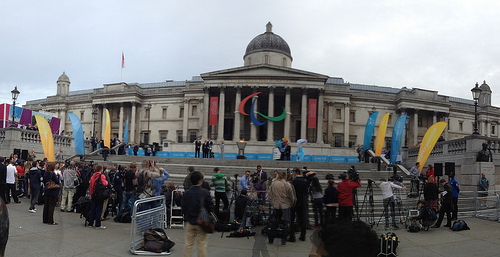


Paralympic Torch Ceremony in London’s Trafalgar Square on August 24, 2012.
Depending on when you read this post, the Opening Ceremonies of the 14th Paralympic Games may already be underway. Will-Kate, as the tabloids are calling the newly betrothed Duke and Duchess of Cambridge, will have led the Royal Family procession just as they did during the Opening Ceremonies of the Olympic Games last month, and viewers in more than 100 countries (none of which are these United States of America) will have witnessed a spectacle intended more to provoke thought and less to entertain than the one produced by Danny Boyle.
In a preview for The Guardian this past Monday, London 2012 Paralympic chairman Lord Coe told Olympics Editor Owen Gibson that the three-hour presentation, entitled “Enlightenment,” would use the examples from that historical period to say something “about ceilings, about human understanding, about limitations and the importance of knowledge.” Gibson also relates a few logistical details:
The ceremony, directed by Jenny Sealey and Bradley Hemmings, will feature more than 3,000 volunteers including 50 disabled performers who have been learning circus skills from scratch. The athletes will come in earlier than during the Olympics opening ceremony, sitting on the track to form part of the audience.
But even though it’s referred to as the “Opening Ceremonies,” what transpires today is actually the culmination of several other events intended to spotlight the achievements of people with disabilities both in the arenas of competition and in everyday life. At the bottom of the story found at this link on the BBC website is a map of the more than three dozen sites on the British Isles that have taken part in either a flame celebration or flame festival that ended in a 24-hour relay to bring the torch to the Paralympic Stadium for the ritual lighting that signals the beginning of the games.
The linked story focuses on the flame festival in the Welsh city of Cardiff, and contains two BBC-produced videos that recount the celebration, which included showcases of wheelchair basketball, rowing, judo, swimming, table tennis, and boccia. The second video focuses exclusively on wheelchair basketball, which is popular enough in Northern Wales to allow for four different teams, comprised of both men and women with disabilities.
The first video also shows some of the football demonstrations (what we in America call soccer); but I would have loved to have seen footage of some of the other participants described in the text as well; such as nine-year-old Ellis Davies’ trying his hand at rowing, and six-year-old Harry Aiken playing table tennis. It’s Aiken’s mother, Nickie, who sums up the whole Paralympic experience in a single sentence, saying:
The Olympics is one thing but it’s really important to show the children anyone can succeed, no matter what their ability is.
Just like with any other child, athletics can help make life matter for a young person with disabilities. That’s why hundreds, and even thousands, of British citizens have turned out for the flame festivals in cities like Cardiff, Edinburgh, Leicestershire, and Weymouth, and why a record number of people are buying tickets for the events or will be tuning into the games through radio, TV, or online channels. Perhaps we are even on the cusp of a new era of intellectual enlightenment when it comes to the inclusion of people with disabilities in our communities.
Comments?
Image by Jon Curnow.